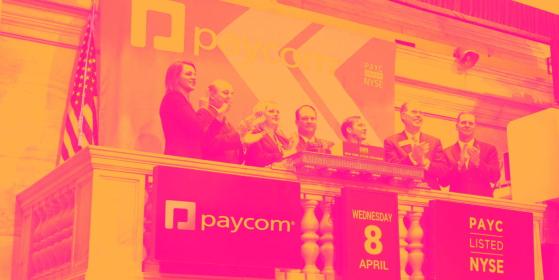Looking back on HR software stocks’ Q3 earnings, we examine this quarter’s best and worst performers, including Paycom (NYSE:PAYC) and its peers.
Modern HR software has two powerful benefits: cost savings and ease of use. For cost savings, businesses large and small much prefer the flexibility of cloud-based, web-browser-delivered software paid for on a subscription basis rather than the hassle and complexity of purchasing and managing on-premise enterprise software. On the usability side, the consumerization of business software creates seamless experiences whereby multiple standalone processes like payroll processing and compliance are aggregated into a single, easy-to-use platform.
The 6 HR software stocks we track reported a mixed Q3. As a group, revenues were in line with analysts’ consensus estimates while next quarter’s revenue guidance was 1.7% below.
Thankfully, share prices of the companies have been resilient as they are up 7.9% on average since the latest earnings results.
Paycom (NYSE:PAYC)
Founded in 1998 as one of the first online payroll companies, Paycom (NYSE:PAYC) provides software for small and medium-sized businesses (SMBs) to manage their payroll and HR needs in one place.Paycom reported revenues of $451.9 million, up 11.2% year on year. This print exceeded analysts’ expectations by 1.1%. Overall, it was a strong quarter for the company with an impressive beat of analysts’ EBITDA estimates.
“We posted solid third quarter results and continue to make significant progress toward full-solution automation,” said Paycom founder, CEO and chairman, Chad Richison.
Interestingly, the stock is up 30% since reporting and currently trades at $224.02.
Is now the time to buy Paycom? Find out by reading the original article on StockStory, it’s free.
Best Q3: Paycor (NASDAQ:PYCR)
Found in 1990 in Cincinnati, Ohio, Paycor (NASDAQ: PYCR) provides software for small businesses to manage their payroll and HR needs in one place.Paycor reported revenues of $167.5 million, up 16.6% year on year, outperforming analysts’ expectations by 3.3%. The business had a strong quarter with an impressive beat of analysts’ EBITDA estimates and a solid beat of analysts’ billings estimates.
Paycor achieved the biggest analyst estimates beat and fastest revenue growth among its peers. Although it had a fine quarter compared its peers, the market seems unhappy with the results as the stock is down 1.6% since reporting. It currently trades at $16.40.
Weakest Q3: Asure (NASDAQ:ASUR)
Created from the merger of two small workforce management companies in 2007, Asure (NASDAQ:ASUR) provides cloud based payroll and HR software for small and medium-sized businesses (SMBs).Asure reported revenues of $29.3 million, flat year on year, falling short of analysts’ expectations by 6.5%. It was a disappointing quarter as it posted revenue guidance for next quarter missing analysts’ expectations.
Asure delivered the weakest performance against analyst estimates, slowest revenue growth, and weakest full-year guidance update in the group. As expected, the stock is down 9.7% since the results and currently trades at $8.97.
Paychex (NASDAQ:PAYX)
One of the oldest service providers in the industry, Paychex (NASDAQ:PAYX) offers its customers payroll and HR software solutions.Paychex reported revenues of $1.32 billion, up 2.5% year on year. This print was in line with analysts’ expectations. Overall, it was a satisfactory quarter as it also put up a decent beat of analysts’ EBITDA estimates.
The stock is up 5.8% since reporting and currently trades at $141.92.
Dayforce (NYSE:NYSE:DAY)
Founded in 1992 as Ceridian, an outsourced payroll processor and transformed after the 2012 acquisition of Dayforce, Dayforce (NYSE:DAY) is a provider of cloud based payroll and HR software targeted at mid-sized businesses.Dayforce reported revenues of $440 million, up 16.6% year on year. This print surpassed analysts’ expectations by 2.7%. More broadly, it was a mixed quarter as it also logged an impressive beat of analysts’ EBITDA estimates.
The stock is up 16.2% since reporting and currently trades at $75.91.
Market Update
Thanks to the Fed’s rate hikes in 2022 and 2023, inflation has been on a steady path downward, easing back toward that 2% sweet spot. Fortunately (miraculously to some), all this tightening didn’t send the economy tumbling into a recession, so here we are, cautiously celebrating a soft landing. The cherry on top? Recent rate cuts (half a point in September, a quarter in November) have kept 2024 stock markets frothy, especially after Trump’s November win lit a fire under major indices and sent them to all-time highs. However, there's still plenty to ponder — tariffs, corporate tax cuts, and what 2025 might hold for the economy.Want to invest in winners with rock-solid fundamentals? Check out our and add them to your watchlist. These companies are poised for growth regardless of the political or macroeconomic climate.
This content was originally published on Stock Story

